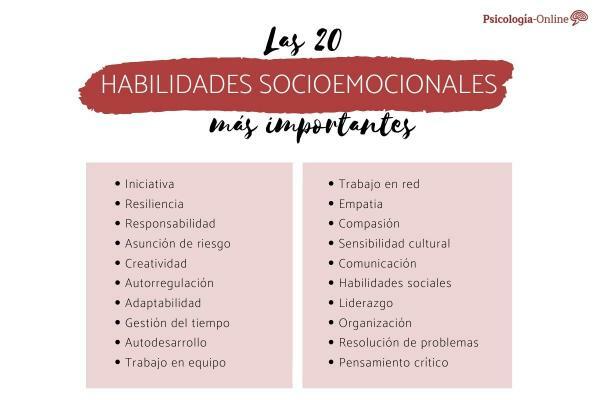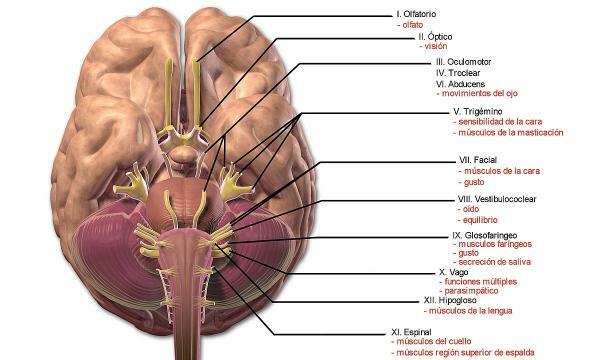
Until a few decades ago it was understood that the IQ was the best and only predictor of personal, social, academic and professional success of people. Currently it is known that there is a much more determining factor in which the person carries out a life project that provides well-being: socio-emotional skills. It is precisely these ways of doing that that will guarantee long, fruitful and profitable roads.
In the following Psychology-Online article we will talk about socio-emotional skills, what they are, their characteristics and importance, their types, examples and how to develop them.
Index
- What are socio-emotional skills: definition
- Characteristics and importance of socio-emotional skills
- Types of socio-emotional skills
- Examples of socio-emotional skills
- How social-emotional skills are developed
What are socio-emotional skills: definition.
According to Duckworth and Yeager, social-emotional skills are those non-cognitive skills that influence efforts toward goal achievement, healthy social relationships, and decision-making
Characteristics and importance of socio-emotional skills.
In the beginning, they were considered as fixed personality traits. However, in recent years, research has changed the way of understanding them, considering them as skills that can be re-incorporated and improved with a deliberate family intervention, educational and Social.
For many years personal and social success was predicted from the I.Q. This index was used as a predictor of the personal achievements of students and adults in their careers. However, for a few decades, different authors have shown how other factors better facilitate the vital development of people: Gardner spoke of "Interpersonal intelligence and Intrapersonal intelligence"and Goleman, based on the works of Gardner, coined the term"emotional intelligence"; etc.
These new concepts, together with others defined later, began to constitute the so-called socio-emotional skills, which could predict life achievement much better than cognitive intelligence tests.
Types of socio-emotional skills.
UNESCO has organized "21st century skills" into three categories:
- Personal skills: those personal characteristics that allow the individual to act effectively in her life.
- Social skills: facilitate satisfactory and positive personal relationships.
- Learning skills: they allow the person to acquire meaningful and useful learning for their life and for society.
Each category includes a set of more specific skills that we will describe below in the next section
Examples of socio-emotional skills.
Here is a list of examples of cognitive skills based on the classification made by UNESCO:
Personal skills
- Initiative: important ability to undertake something new.
- Resilience: allows you to successfully overcome obstacles and move forward with new goals.
- Responsibility: pushes to make the effort necessary to carry out a project.
- Risk assumption: do not be afraid of dangers, looking for effective solutions.
- Creativity: to create new things or ways useful for our purpose. In this article we explain How to develop creativity.
- Self-regulation: an important skill that allows us to invest our strength when it is at its maximum potential, rest when we need it, take time to reflect, etc. It allows essential personal care to carry out our life optimally.
- Adaptability: flexibility necessary to adjust to the social group and the environment in which we relate, without falling into submission.
- Time management: allows us to prioritize and be efficient. Here you will find Time management tools and techniques.
- Self-development: necessary to evolve along with life and not stagnate.
Social skills
- Teamwork: essential to integrate all personal skills into a common project. The result in this way is much more fruitful.
- Networking: to make it more effective.
- Empathy: essential to promote a pleasant climate of personal relationships. In the following article you will find How to practice empathy.
- Compassion: nourishes and unites people.
- Cultural sensitivity: allows us to open our consciences to other knowledge and worlds and nourish ourselves with them
- Communication skills: necessary aspect to transmit objectives and specify them. Here you will find Techniques for effective communication.
- Social skills: essential to carry out a joint project through personal relationships
- Leadership: greatly favors the management and effectiveness of group work. In this article you can read more about leadership and its types.
Learning skills
- Organization: every project requires planning and organization.
- Problem resolution: overcome obstacles and create from new perspectives.
- Critical thinking: basis on which creative, efficient and useful cognitive work becomes possible.
Planning the positive development of these skills from an early age will allow students to express their inner potential and develop according to their needs in a healthy way and in harmony with others, a guarantee of personal satisfaction and, with it, good life Proyect.
How social-emotional skills are developed.
Taking into account the importance for personal and professional development of social-emotional skills, the importance of their development from an early age is emphasized. The steps to follow to develop these skills from the early educational years will be:
- Develop a theoretical framework that supports the project
- Identify socio-emotional competencies
- Train teachers
- Create curricular content adapted to different educational levels
- Create assessment and diagnostic instruments
- Implement the change
- Evaluate the project permanently incorporating the necessary changes
In the following articles you will find specific guidelines and strategies for the development of some social-emotional skills:
- Activities to work empathy in adolescents
- Strategies to improve social skills in children
- Strategies to develop critical thinking in boys and girls
- Troubleshooting technique
This article is merely informative, in Psychology-Online we do not have the power to make a diagnosis or recommend a treatment. We invite you to go to a psychologist to treat your particular case.
If you want to read more articles similar to Socio-emotional skills: what are they, types and examples, we recommend that you enter our category of Personal growth and self-help.
Bibliography
- Bisquerra Alzina, R. (2003). "Emotional education and basic skills for life". Journal of Educational Research. Vol. 21, No. 1, pp. 7-43.
- García Cabrero, B. (November-December 2018). "Socio-emotional, non-cognitive or soft skills: approaches to their evaluation". University Digital Magazine. Vol. 19, num. 6.


